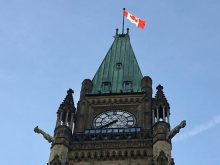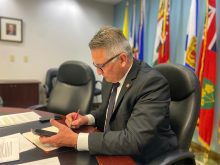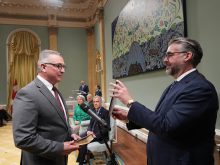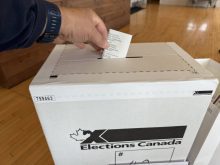John Barlow is hoping a new Conservative federal government will bring agriculture to the adult table after the April 28 vote.
“I find it disappointing that agriculture has sort of been at the kids table in this government for the last 10 years,” said Barlow, MP for the southern Alberta riding of Foothills and the shadow minister of agriculture.
“There is incredible potential here, because the world needs what Canada produces, affordable, reliable, sustainable, nutritious food products, not only to help feed Canadians, but help feed the world.”
Read Also

StatCan stands by its model-based crop forecast
Statistics Canada’s model-based production estimates are under scrutiny, but agency says it is confident in the results.
He describes Canadian agriculture as an “incredible opportunity” that needs a voice at the table.
“I am so proud of the fact that Pierre Poilievre talks about farmers and agriculture every single day,” he said.
With a cup of Tim Hortons on his desk to fuel his public engagement efforts, he spoke to the Western Producer from his satellite campaign office in Okotoks, shortly before heading out to door knock in Blackie and Nanton. As the Conservative and Liberal parties battle for the lead in campaign polls, Barlow noted the Liberal government has stifled agriculture at every turn through carbon taxes, fertilizer reduction, pesticide reduction and other changes, as a result painting the industry in a bad light.
“That is sending a message to consumers that there’s a problem with Canadian agriculture,” Barlow said, noting the numbers don’t support that. Canadian farmers produce more with less emissions than their counterparts elsewhere, and it’s that story which needs to be told, Barlow said.
Barlow has some experience in crafting a compelling narrative. In a previous life he was an award-winning journalist and associate publisher and editor for the Okotoks Western Wheel. He’s taken the journalist’s art of casting an attentive ear to detail and crafting a tough question to Ottawa.
He’s heard from farmers during this campaign that tariffs are their most important issue, in light of the ongoing U.S. trade actions around the world, including sanctions against Canada, and Chinese tariffs aimed at canola oil and meal, and pork.
“Out here, the tariffs with China are more resonant than even Trump, obviously with the canola and pork,” Barlow said. “Those are having the impact right now.”
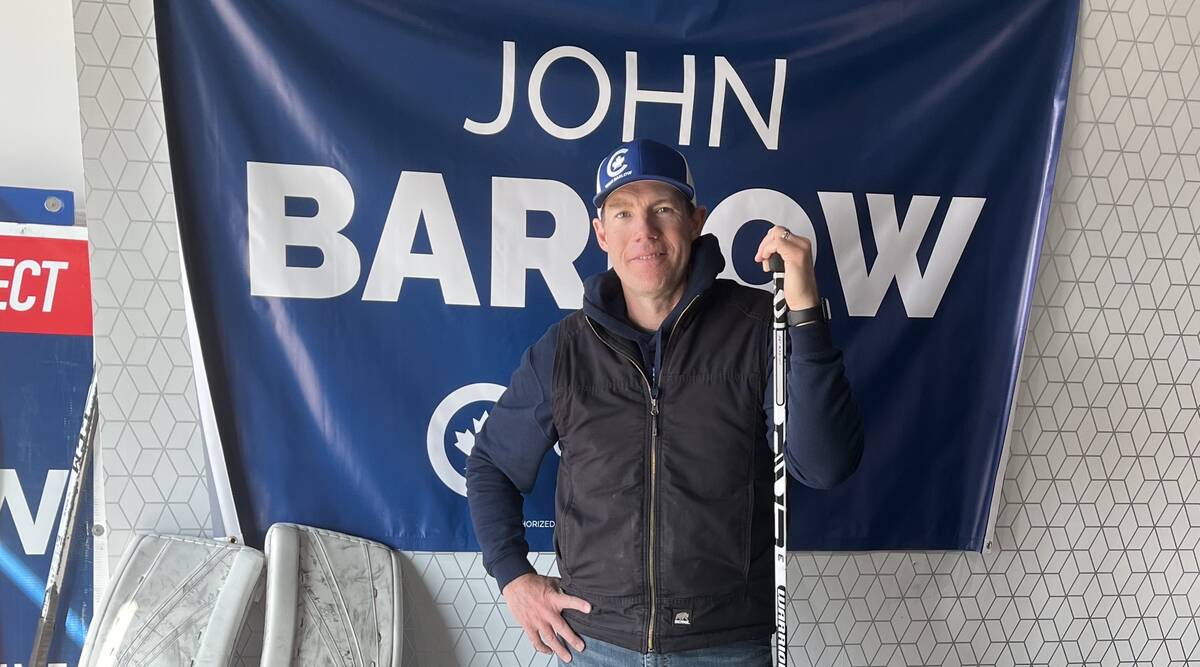
He also said carbon taxes are still top of mind. While it’s been cut at the consumer level, there’s still an industrial levy that the current government says is necessary for trade, which makes farmers uneasy.
“There’s a lot of unknowns,” Barlow said. “The biggest thing is the farm groups want someone who is going to be on their side and they certainly have not had that the last 10 years.”
Nation building
Trump’s actions have plunged world markets into uncertainty. But where the world has seen fear, Barlow sees an opportunity for nation building, increased national unity and a more resilient Canadian economy.
“It’s been a wake-up call,” Barlow said. “When is the last time interprovincial trade barriers have been an election issue, or diversifying trade markets or building infrastructure like highways, ports, railways? Canadians seem aligned on addressing these long-time irritants.”
That includes, according to Barlow, the national energy corridor. Conservative Party leader Poilievre is proposing to fast-track approvals for transmission lines, railways, pipelines and other critical infrastructure across Canada in a pre-approved transport corridor entirely within Canada, compared to the current government’s continued support for anti-pipeline legislation. He noted growing unity around the concept of an east-west pipeline.
“Seventy-five per cent of Quebecers support an east-west pipeline with the most recent polling,” said Barlow. “The Prime Minister is once again, as Trudeau did before him, is picking winners and losers, one part of the country over another.”
The new reality of trade means investing in this sort of infrastructure to improve domestic and international trade is more important than ever.
“We need to diversify our trade markets. That means investing in infrastructure,” said Barlow. “We also have to have specific retaliatory tariffs that are targeted that will impact Americans and have as little of an impact on Canadians as we can. It’s not impossible.”
Alberta’s impact on the United States, and vice-versa, cannot be understated, Barlow said, stressing prolonged tariffs on each other will only hurt the aligned interests of the agriculture sector on both sides of the international border, a case he’s made to state representatives in the U.S.
“Alberta is the number-one trade partner for 23 different states,” he said. “That is just us as a province, not as a country. I think most Americans now understand that this trade war between Canada and the United States is not healthy for either one of us, especially agriculture because it is so integrated.”
Barlow knows with hundreds of commodity groups stretching across 5,500 kilometres of land mass, you are not going to keep everyone happy all the time. The key is to have a level playing field all agriculture can benefit from and core principles to guide policy. That sort of common ground isn’t hard to find, he says.
He says most farmers want a competitive tax and regulatory regime, a reliable supply chain, access to labour for their operations and for regulators to work with, not against, agriculture.
“Those are the four things we are going to focus on,” he said.






